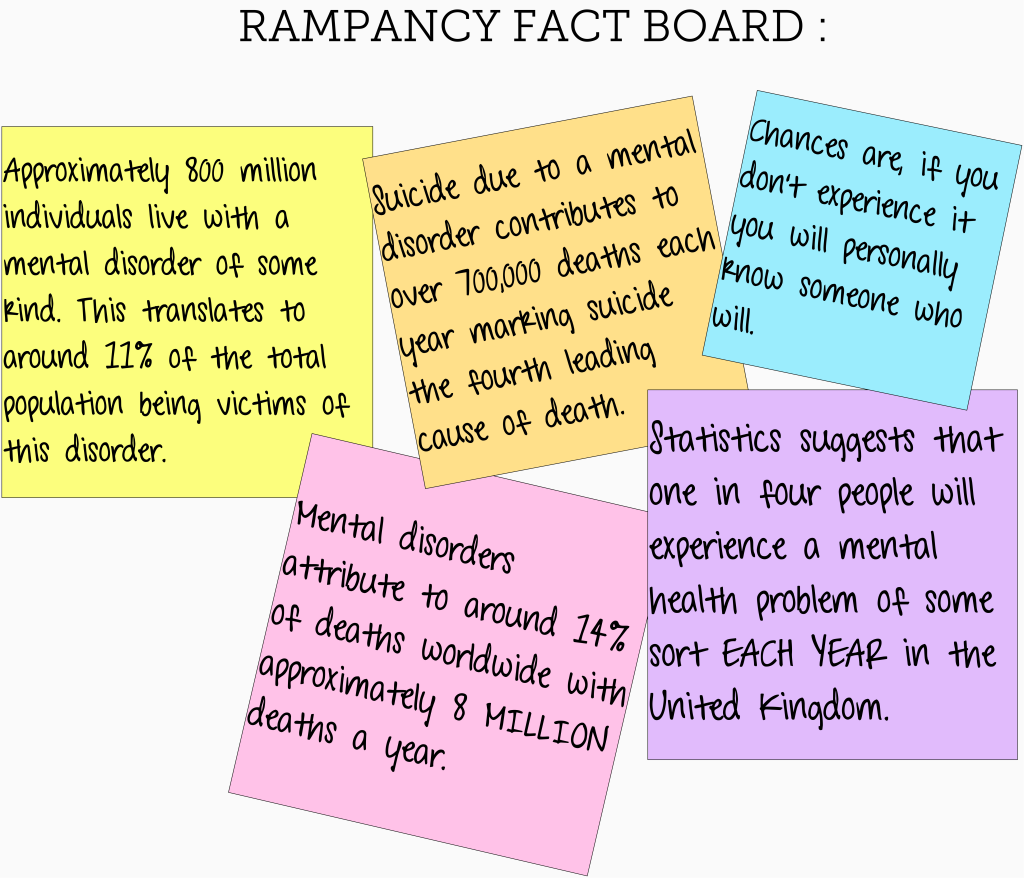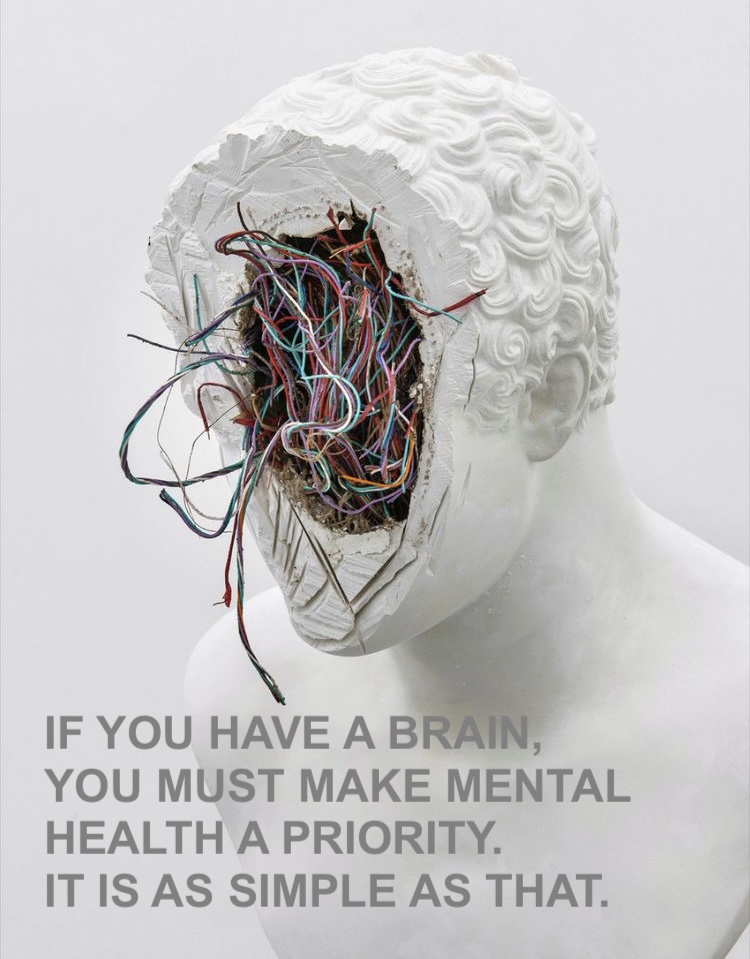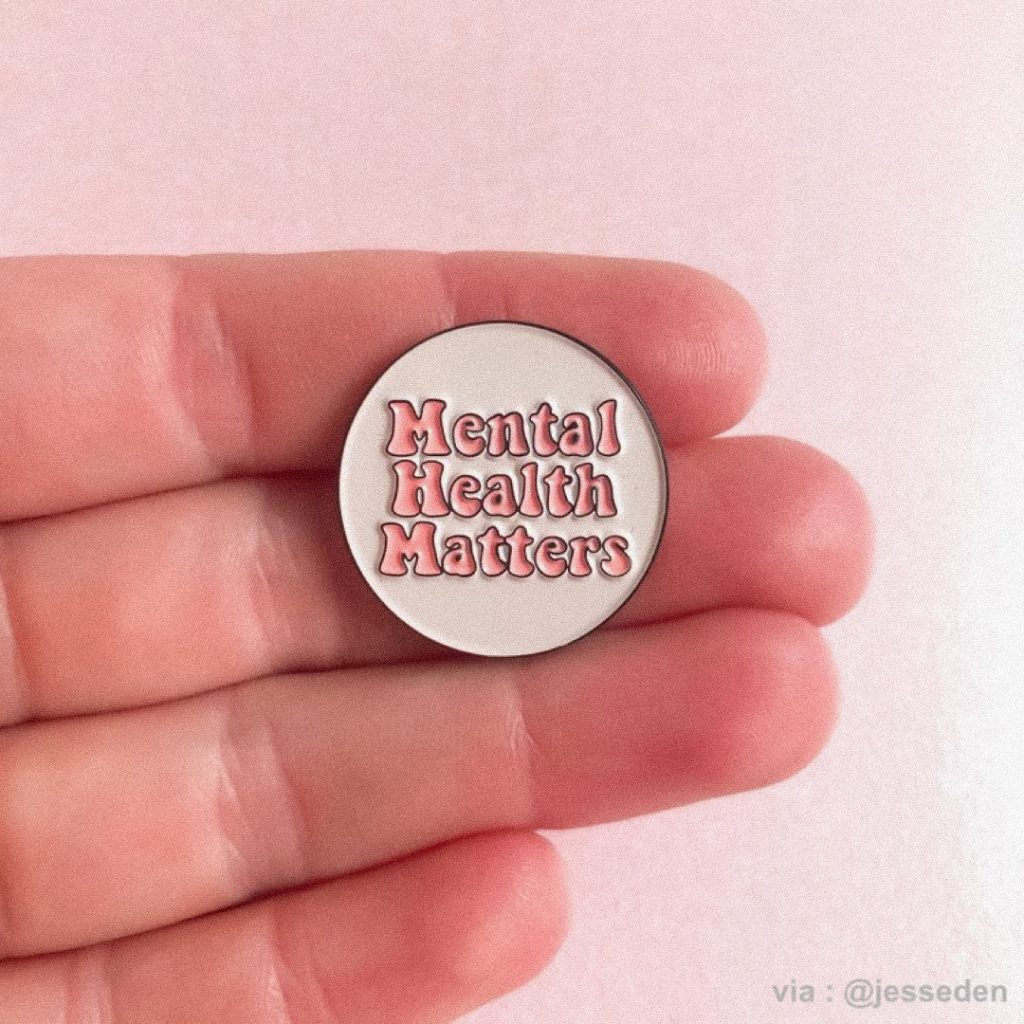The rampancy of mental disorders and its ironic need for advocacy
Despite mental disorders being the leading cause of ill-health and disability worldwide, mental health awareness and its advocacy are ironically still in their infancy. For the awareness, treatment, and advocacy of such a rampant disorder to still be in its nascent period of development and implementation definitely adds fuel to the current fire that is keen to cause more damage if not attended to immediately. Factually speaking, mental health care and mental disorders are rarely spoken about. This is because such disorders and “inconveniences” are pretty loyal members of the paradox of self-stigmas and self (or) society induced shame.
In 2017, a 13% rise was noted in mental health related conditions worldwide. Experts predict that this surge will most likely increase in the years to come as these disorders are not being treated as a bodily disorder that need medical intervention but are instead being hushed by stigmatic whispers. It is no news that mental health comes with its own added baggage of elements, consisting mainly of stigmatic whispers, supposed anathemas, and supposed shame. Contrary to what society has forced down our throats, mental health is in-fact as valid, important & necessary as physical health. Mental disorders are in-fact real diseases that require the same level of care as physical illnesses like cancer or heart conditions.

What is mental health ?
According to the World Health Organisation, Mental health refers to “a state of well-being in which an individual realizes his or her own abilities, can cope with the normal stresses of life, can work productively, and is able to make a contribution to his or her community.”
In laymen term, mental health refers to an individual’s cognitive, behavioural, and emotional well-being. It is all about how an individual thinks, feels, and behaves. Taking care of our mental health in every stage of our lives is crucial because it affects and helps balance all part of our life, from our relationships with friends and family to our productivity levels at jobs and schools. It has an impact on our ability to deal with stress, adapt, and address problems. It also has an impact on our ability to be happy, productive, and well-adjusted.
Why is mental health important and why must one make it a priority ?
Let me begin by stating that an individual does not necessarily have to be diagnosed with a mental disorder to care for their mental health and make it a priority. Although they are mistakenly interchanged often, poor mental health and a mental disorder are not the same thing.
Poor mental health can be the result of stress and grief that arise from existential factors like bereavement, loneliness, poverty, financial difficulties, etc. Whereas, a mental disorder is a disorder of the human body that is caused by chemical alterations and imbalances in the brain. Although not entirely the same, mental health and mental disorders do, in-fact, have a fierce correlation. Studies show that the trauma caused by poor mental health has the power to trigger a mental disorder in individuals who are susceptible enough. This factual correlation is one of the biggest reasons that should urge an individual to take care of his/her mental health.
Although there maybe environmental factors that play a towering role in developing mental disorders, a person’s inherited genetic susceptibility to mental disorders tops the list. An individual can never be sure of what he/she is genetically susceptible to and to what extent, this is why it is extremely crucial for everyone single human being to make mental health care their top priority.
Apart from this, poor mental health is linked to physical health conditions. Studies have shown that individuals with poor mental health have a greater risk of conditions like heart disease, high blood pressure, obesity, diabetes, and stroke.
Mental health is linked to a variety of social challenges on a global scale, including social inclusion, economic development, job prosperity, and human rights.

Deepika Padukone and neuroscientist/physician Dr. Murali Doraiswamy sit down to discuss tackling the stigma surrounding mental health issues.
How can we help ?
We as a society, need more candour, more advocacy and fewer stigmatic whispers! We need to normalise the fact that the brain too can fall ill. We need to advocate normalcy in getting medical help and not shame or stereotype the ones who do. Mental health needs to be equally prioritised as physical health. We must ensure to educate ourselves and the people around us in fields that may not be of great knowledge to us if our aim is to avoid paving such poorly educated paths for our children and theirs. Fighting mental disorders is already an extremely tedious and painful journey. Let’s not make it worse by acting like catalysts to the possibly perishable stigma that claims lives time and again.
We also need to normalise and prioritise speaking up and being kind as the human brain is not wired to handle extreme trauma. The importance of being kind goes a little further beyond morality, studies show that events like bullying, harassment, and social isolation tend to take a psychological toll on the mind and have the potential of triggering mental disorders in individuals susceptible enough. A disorder that had a chance to stay dormant for a very long time.
The first big positive change that society should aim to see is the destigmatization of this illness. Society must, foremost, stop feeding into the stigma. They must also make a conscious effort to stop romanticising these disorders. Instead of eradicating the stigma around mental disorders, society seems to add to it. We are not only spreading a false notion about a disorder that kills, but we are also trivialising and belittling the struggles of people who actually suffer from this illness.
People who can afford to donate must do their philanthropic bit and donate towards the well being of the mental health of the poor. The poor often carry an excessive part of the burden of mental disorders, both in terms of the risk of developing a mental condition and the lack of access to treatment. Constant exposure to highly stressful circumstances, hazardous living circumstances, exploitation, and poor health in general all contribute to the poor’s increased susceptibility. The absence of inexpensive treatment worsens the illness’s severity and debilitation, creating a vicious spiral of poverty and mental health illnesses that is hardly ever broken.
We still have a long way to go for mental disorders to get the same candour, rights, and respect as physical disorders get, but we have to start somewhere.

How can they help ?
The government must consider making strategic decisions and choices in order to bring about positive change in the acceptance and treatment of mental disorders. The Department of Health and Human Services can offer a helping hand that would benefit many if they considered implementing the following suggestions into their healthcare system :
• Including consultation fees in insurance claims and not just hospitalisation : Solely covering hospitalisation costs is problematic and futile. Factually speaking, it’s very rare for a victim of a mental disorder to be hospitalised. Most of the time, patients do not get the care they need as they are not able to afford multiple consultation fees, as the number of consultations for a mental disorder is drastically different in comparison to the consultation for a physical one.. We all deserve to heal, but unfortunately, not everybody can afford that, and that’s exactly where the concept of insurance comes into play.
• Integrate mental health with primary care services.
• Recognize the high prevalence of trauma, violence, and abuse in the lives of women,
girls, and children who have been excluded from the system.
• Accelerate research on mental heath and mental disorders.
• Increase sustainability to aid recovery.
• Implement mental health care plans and policies in the numerous number of the countries that have no active mental health programme.
Why seek help?
Just like any other physical disorder, mental disorders are controllable, if not curable, with the help of medications and treatment, as they are just another ill part of the human body. Unfortunately, nearly two-thirds of people suffering from mental disorders never seek medical help from a professional. This could be due to a variety of factors such as stigma, discrimination, neglect, shame, and ignorance.
The World Health Organisation affirmatively states that over 80% of patients with schizophrenia can be relapse-free after one year of treatment with antipsychotic drugs paired combined with family involvement. Up to 60% of patients suffering from depression can recover with the right mix of antidepressant medicines and psychotherapy and up to 70% of patients with epilepsy can be seizure-free when basic, low-cost anticonvulsants are used. More than half of the disorders that annually claim numerous lives can be treated with the help of medical intervention, but only the patient can make that crucial step of deciding and agreeing to seek help.
References :
• https://www.medicalnewstoday.com/articles/154543
• https://www.futurelearn.com/info/blog/world-mental-health-day

Very well written,very insightful view that really changes the perspective and stigma towards mental health.
thank you ruku ! (:
Great work Sanjana we are so focused on the other organs and ailments linked to heart lungs or kidney and try to keep their functions up-to mark and always ignore the function of brain or our thoughts which could affect our mind and if that is not controlled it is a complete shutdown
You have done an excellent work to emphasise the importance of mental health which is priority of this age
thank you for taking time out to read my blog ❤️
Very meaningful insight on the concept of Mental Wellness. very well written Sanjana…..
thank you (: (:
Well written. The pains of mental health is brought out very well. Families, care givers benefit when more and more people going through this illness come out. Hope the authorities also take note and do their pet in making these illness more accepted and supported in society. All power to you and many others in this boat.
thank you sm☺️
Very well written and beautifully expressed my dear girl sanj!! God bless you abundantly and always!!
Thank you Liza aunty!! hope all’s good ❤️
It’s so important to bring focus to mental health matters!
Thank you for the informative content!
thanks shivvv! it really is x
This is amazingly written. So proud 👏🏻👏🏻
thank you ❤️
Crisp and neat !! You have done well by choosing to write on such an important topic. 🤗🤗
thanks mum 🥰
Great read👏 Such an important issue
thanks david!! (:
Well written post on a sensitive and topical subject of Mental Health. Significant efforts are required to create Awareness to remove the social stigma attached to mental health issues and provide timely treatment at low cost. As a society we need to be more empathetic towards those suffering from mental health and help support their quick recovery. Best wishes to you for this timely post and for all your future endeavors.
thank you so much (:
Good job.
🥰
Very well written, dear Sanjana 👏👌 God bless . Such an important issue.
thank you sm 🥰
Very informative and a great perspective on such an important topic! 👏🏼
thank you bali ! x
well written! we should all talk more about mental health.
we definitely should! thank you x
This was an amazing read! Very well written. Great job!
thanks bhaks ❤️
We should make our mental health a priority. Absolutely resonated with this article! ✨
we must simmy, thank you ❤️
Very well written! It brings out an issue that has always been pushed aside.
thank you (:
“Let’s not make it worse by acting like catalysts to the possibly perishable stigma that claims lives time and again”
– Wow! Beautiful choice of words! 👌🏽 Well written! 👏🏽
thank you sm x
Amazing blog! Enjoyed reading ot Sanjna
thanks k <3
It’s great to see the youth of today coming forward and taking the initiative to create a platform to discuss mental health and the stigmas attached to it. Well done Sanjana !
thank you sm geetu aunty ❤️ hope you’re well
This is a great post for such an important topic, mental health! well done!
thank you Stalo <3
Super write up Sanjana. Very important!
thank you (:
Well-written, Sanjna, you raised pertinent, valid points.
thank you sm Ratna aunty ❤️
Very well articulated , Sanjana.
Hopefully there would be a great emphasis on mental health in the years to come.
thank you 🥰
Well written Sanjana!
thank you 🥰
Well written, excellent choice of words to drive home your point! This issue definitely requires our attention!
thank you so much ! glad i made sense (:
Most aptly written Sanjana. Good work, very well covered 👍👌
thank you Bharathi aunty ❤️
A very important topic very well articulated 👏👏
thank you (:
Excellent article. Well articulated with the perfect content for someone learning about mental health. Hope this gains a large audience!
thanks a bunch for taking time out to read it ☺️
Mental disorder & poor mental health explained clearly. Enjoyed reading this very well written & highly informative article. Well done Sanjana!!
thank you <3
Very well written and very informative.
thank you !! 🥰
Good read, well written & very informative too. Liked the way you explained the subtle difference between poor mental health & mental disorder. Well done Sanjana!!
thank you so much for taking time out to read this article ❤️
Very well articulated Sanjana! It was a great read!
thank you 🥰
Absolutely well written and this is indeed the need of the hour
I suggest that the global policy makers also factor this in their policy too
Indeed yoga and ayurveda put good health as sync between mind , body and Atma
Kudos for taking this initiative
they all go hand in hand, thank you! (:
Its wonderful to see you focus on a so called “taboo issue”. Appreciate your indepth analysis and possible solutions to the problem.
Well done Sanjana !!
thank you 🥰
Excellent..very well written..keep up the good work Sanjana…An important issue addressed very well..God bless you 🙏
thank you ! (:
Thoughtfully written especially during the month when we are focused on mental health. This is no longer a stigma and should be actively discussed. I am proud that you are elevating this pandemic that is many times not spoken of or dismissed. Well done and keep up the advocacy
thank you for taking time out to read it ☺️
Impressive write-up Sanjana 👌You have covered all important aspects of a multi dimensional state of mind in a concise article. Best wishes my dear🤗
thank you 🥰
Dear Sanjana
Very well written and articulated. Mental Health and well being certainly matters just like physical health. In India, discussion about mental health is still a taboo. I am sure your article will give a different perspective, create more awareness and insight amongst us..
All the very best and wish you success..
thank you sm, appreciate it ☺️
Very well written Sanjana, I agree with you on the need to integrate mental health with primary health care. Most of us in the previous generations were told to just suck it up and be strong and all will be ok. sigh.. if only it was that easy. Very articulate and thoughtfully written. Wish you the best . I am your mom’s good friend.
Thank you so much for taking time out to ready my blog Vidya aunty ☺️ If only it was that easy indeed !